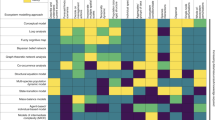Abstract
Ecosystem Informatics is the study of computational methods for advancing the ecosystem sciences and environmental policy. This talk will discuss the ways in which machine learning—in combination with novel sensors—can help transform the ecosystem sciences from small-scale hypothesis-driven science to global-scale data-driven science. Example challenge problems include optimal sensor placement, modeling errors and biases in data collection, automated recognition of species from acoustic and image data, automated data cleaning, fitting models to data (species distribution models and dynamical system models), and robust optimization of environmental policies. The talk will also discuss the recent development of The Evidence Tree Methodology for complex machine learning applications.
Preview
Unable to display preview. Download preview PDF.
Similar content being viewed by others
Author information
Authors and Affiliations
Editor information
Editors and Affiliations
Rights and permissions
Copyright information
© 2009 Springer-Verlag Berlin Heidelberg
About this paper
Cite this paper
Dietterich, T.G. (2009). Machine Learning and Ecosystem Informatics: Challenges and Opportunities. In: Zhou, ZH., Washio, T. (eds) Advances in Machine Learning. ACML 2009. Lecture Notes in Computer Science(), vol 5828. Springer, Berlin, Heidelberg. https://doi.org/10.1007/978-3-642-05224-8_1
Download citation
DOI: https://doi.org/10.1007/978-3-642-05224-8_1
Publisher Name: Springer, Berlin, Heidelberg
Print ISBN: 978-3-642-05223-1
Online ISBN: 978-3-642-05224-8
eBook Packages: Computer ScienceComputer Science (R0)




